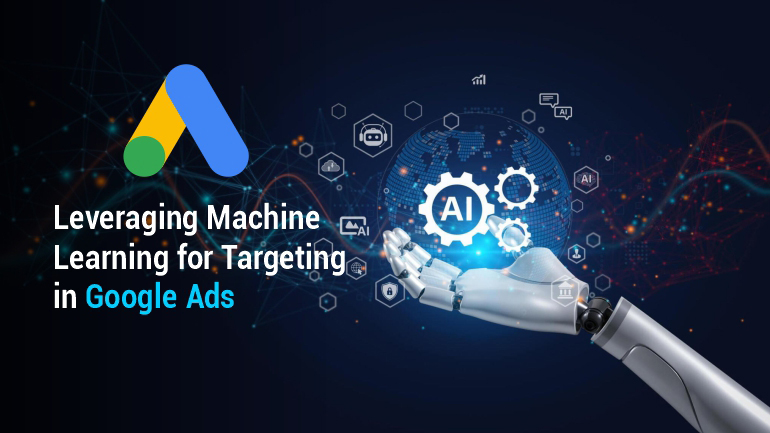In today's digital age, online advertising has become an essential part of every successful business strategy. With millions of users browsing the internet daily, reaching the right audience is crucial for maximizing the effectiveness of your ads. This is where machine learning comes into play. By leveraging the power of machine learning, Google Ads provides marketers with advanced targeting capabilities, allowing them to reach their desired audience with precision and efficiency. In this article, we will explore how machine learning is revolutionizing targeting in Google Ads and the benefits it brings to advertisers.
Machine Learning: Transforming Targeting in Google Ads
Machine learning, a branch of artificial intelligence, equips computers with the ability to learn and make intelligent decisions without being explicitly programmed. Google Ads utilizes machine learning algorithms to analyze vast amounts of data and predict user behavior, interests, and intent. Through this analysis, the platform can serve ads to users who are most likely to engage with them, increasing the probability of conversions and maximizing ROI.
Advanced Demographics Targeting
One area where machine learning greatly enhances targeting in Google Ads is demographics. Traditional demographic targeting relied on broad categorizations, such as age, gender, and location. However, machine learning algorithms enable Google Ads to go beyond these basic demographics and dive deeper into user characteristics. By analyzing user behavior patterns, machine learning can identify more nuanced details, such as user preferences, interests, and affinities. This level of precision allows advertisers to tailor their ads to specific audience segments, ensuring their message resonates with the right people.
Contextual Targeting with Natural Language Processing
Another powerful targeting tool enabled by machine learning is contextual targeting. Google Ads leverages natural language processing (NLP) algorithms to understand the meaning and context of web pages. By analyzing the content of a webpage, machine learning algorithms can determine its topic, relevance, and sentiment. This information helps Google Ads understand which ads would be most relevant and impactful for users visiting a particular webpage. As a result, advertisers can display their ads alongside content that is highly relevant to their target audience, increasing the likelihood of capturing their attention and driving conversions. here you go for google ads agency in dubai.
Predictive Audience Segmentation
Machine learning not only enhances targeting based on demographics and web content, but it also enables predictive audience segmentation. By analyzing historical data, machine learning algorithms can identify patterns and trends in user behavior, enabling advertisers to target users who exhibit similar characteristics and preferences. This predictive modeling allows advertisers to reach potential customers who may not have been considered through traditional targeting methods. With the ability to expand their reach to untapped audience segments, advertisers can potentially unlock new revenue streams and discover previously undiscovered business opportunities.
Optimized Bidding and Ad Placement
Effective targeting in Google Ads goes beyond reaching the right audience – it also involves efficient bidding and ad placement. Machine learning algorithms analyze historical performance data to determine which ad placements and bidding strategies yield the best results. By automatically adjusting bids and ad placements based on real-time data, Google Ads maximizes the chances of ad visibility and engagement. This allows advertisers to allocate their budget more intelligently, focusing on platforms and placements that generate the highest returns.
Conclusion
Machine learning has revolutionized targeting in Google Ads, empowering advertisers with advanced capabilities to reach their desired audience with precision. By leveraging machine learning algorithms, Google Ads can analyze vast amounts of data and predict user behavior, enabling advertisers to tailor their ads to specific audience segments. From advanced demographics targeting to contextual targeting with natural language processing, machine learning enhances the effectiveness of Google Ads by delivering highly relevant and impactful ads to users. As machine learning continues to evolve, advertisers can expect further advancements in targeting capabilities, giving them a competitive edge in the digital advertising landscape. So, embrace the power of machine learning and leverage its potential to maximize the impact of your Google Ads campaigns.
FAQs
Q1.How does machine learning enhance demographic targeting in Google Ads?
A: Machine learning in Google Ads goes beyond traditional demographics, utilizing algorithms to analyze user behavior patterns, preferences, and interests. This allows advertisers to create more nuanced and tailored ads for specific audience segments, increasing resonance and engagement.
Q2.What is contextual targeting, and how does it work with machine learning in Google Ads?
A: Contextual targeting involves using natural language processing (NLP) algorithms to understand the meaning and context of web pages. Machine learning analyzes webpage content to determine relevance and sentiment, helping Google Ads display ads alongside content that is highly relevant to the target audience.
Q3.How does machine learning enable predictive audience segmentation in Google Ads?
A: Machine learning analyzes historical data to identify patterns and trends in user behavior. This enables advertisers to target users with similar characteristics and preferences, expanding reach to untapped audience segments. Predictive modeling helps advertisers discover new revenue streams and business opportunities.
Q4.What role does machine learning play in optimized bidding and ad placement in Google Ads?
A: Machine learning algorithms analyze historical performance data to determine the most effective ad placements and bidding strategies. By adjusting bids and ad placements in real time, Google Ads maximizes ad visibility and engagement, allowing advertisers to allocate their budget more intelligently for higher returns.
Q5.How can advertisers benefit from embracing machine learning in their Google Ads campaigns?
A: Prioritizing robust security measures in Android app development ensures the protection of user data from unauthorized access and potential threats. Businesses in Dubai can benefit from enhanced trust and confidence among users, leading to sustained customer loyalty and positive brand perception.
Categories
- Software Development
- Web Development
- iOS Development
- UI/UX Design
- Web Design
- Digital Marketing
- Graphic Design
- Android Development





